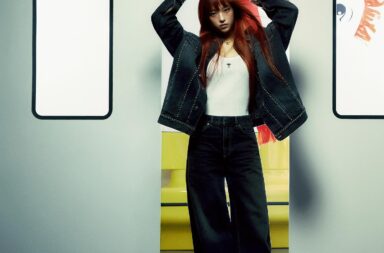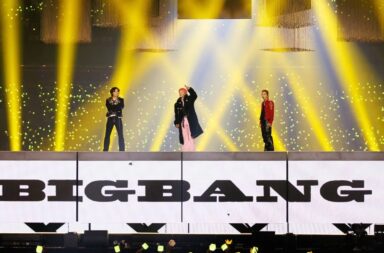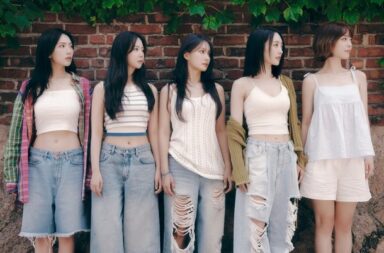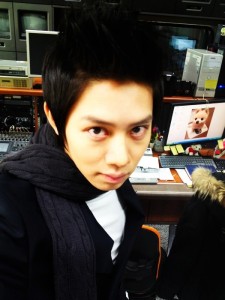 The “variety-dols,” or variety idols, play a telling role in the realm of K-pop. As the name implies, this title is awarded to those special idols who excel in K-variety, those idols whose prominent personalities have appealed to the masses. Examples include 2AM‘s Jo Kwon, Super Junior‘s Heechul, and ZE:A‘s Kwanghee. As variety is a very unique and potentially highly beneficial aspect of idol culture, variety idols play fairly prominent roles in the group or parties they reside in.
The “variety-dols,” or variety idols, play a telling role in the realm of K-pop. As the name implies, this title is awarded to those special idols who excel in K-variety, those idols whose prominent personalities have appealed to the masses. Examples include 2AM‘s Jo Kwon, Super Junior‘s Heechul, and ZE:A‘s Kwanghee. As variety is a very unique and potentially highly beneficial aspect of idol culture, variety idols play fairly prominent roles in the group or parties they reside in.
Whether these members contribute to their groups musically seems not to matter — though of course it would be great if they do, since these members can contribute to their respective groups in their own ways, using their talents outside of music for the benefit of their groups. These variety idols are able to spread their group’s name and lure fans in with their inviting personalities through their outside activities, with their ultimate goal to add to their group’s fanbase come the time their group chooses to make a comeback. Also, these variety idols are able to lighten the mood during group interviews or shows, serving as a mood-maker of sorts to help ease in their less outgoing group members into the flow.
For these reasons, the demand for these potentially highly beneficial variety idols has gone up. It’s even come to the point where it’s becoming increasingly clear companies are now designating variety idols, instructing particular idols to ham up their personalities in front of cameras in an attempt to achieve these desired results. The benefits of these members’ outside variety activities really can’t be argued. Relevancy and publicity are things most idols strive for, and these are the very things said outside promotions achieve. The worst that could happen to a variety-dol in these outside promotions is for them to be seen as unlikable, which is a fully subjective matter in the first place. But other than that, are these “designated variety members” really that beneficial for the balance of their group, seeing how they’re becoming almost a requirement for debuting groups? By definition of their name alone, their job is to enhance their group’s variety skills and likability, but are they really productive in doing so?
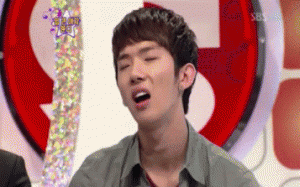 While these designated members certainly help set the mood, a group can’t rely solely on that one member when it comes to variety, something more and more groups have been doing as of late. When it comes to the highly involved nature of variety, there’s a requirement for balance in dynamics, a requirement that everyone gets involved as possible, lest the atmosphere seem contrived or unnatural. If the entire variety show is dominantly run by one or two members, not only do these members risk being seen as attention-hogs, but the remainder of the members also risk being seen as uninvolved or dismissive if all they do is nod and smile along. While it makes complete sense to have your wittiest, funniest, or most eloquent member serve as the group’s spokesperson of sorts, other members really need to participate as well in attempt to continue the atmosphere their moodmaker created.
While these designated members certainly help set the mood, a group can’t rely solely on that one member when it comes to variety, something more and more groups have been doing as of late. When it comes to the highly involved nature of variety, there’s a requirement for balance in dynamics, a requirement that everyone gets involved as possible, lest the atmosphere seem contrived or unnatural. If the entire variety show is dominantly run by one or two members, not only do these members risk being seen as attention-hogs, but the remainder of the members also risk being seen as uninvolved or dismissive if all they do is nod and smile along. While it makes complete sense to have your wittiest, funniest, or most eloquent member serve as the group’s spokesperson of sorts, other members really need to participate as well in attempt to continue the atmosphere their moodmaker created.
So quite ironically, the over-reliance for these designated variety-dols is hampering idol groups’ overall variety prowess, since they indirectly discourage other members from participating. While this isn’t as big of a deal in individual interviews, this over-reliance gets particularly grating in variety. Due to their popularity, completely idol-based variety shows are being funded by television stations as chances for fans to get to know their idols better. But because of one or two members being designated as the ones in charge of variety in their group, these shows end up being one or two-men-shows, completely missing the original objective of idol-based variety.
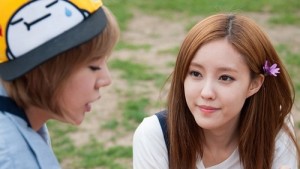 Take for example T-ara. Quite obviously, their group dynamics and relations have been questioned time and time again due to their unfair line distributions and recent controversy. But the unfortunate group also suffers from relying on only a handful of members to carry them through variety. Only Hyomin, Eunjung, Soyeon, and Jiyeon have ever really displayed clear variety personas, leaving other members Qri, Boram, and (now ex-member) Hwayoung unresponsive and timid in their multiple variety shows. While these girls could just be naturally shy, their lack of participation in even variety surely didn’t quell the questioning of their use in T-ara. Moreover, the atmosphere of the girls’ variety shows was consequently off and unnatural since only a handful of the members ever really attempted to bond with camera.
Take for example T-ara. Quite obviously, their group dynamics and relations have been questioned time and time again due to their unfair line distributions and recent controversy. But the unfortunate group also suffers from relying on only a handful of members to carry them through variety. Only Hyomin, Eunjung, Soyeon, and Jiyeon have ever really displayed clear variety personas, leaving other members Qri, Boram, and (now ex-member) Hwayoung unresponsive and timid in their multiple variety shows. While these girls could just be naturally shy, their lack of participation in even variety surely didn’t quell the questioning of their use in T-ara. Moreover, the atmosphere of the girls’ variety shows was consequently off and unnatural since only a handful of the members ever really attempted to bond with camera.
A more severe case could be argued with ZE:A. Their resident variety-dol Kwanghee surely does his job of getting attention, whether we love him for it or not. But as fundamental as the crazy Kwanghee is to the group, he just overwhelms the other members with his zeal and hyperactivity when they appear on shows together. While other members Dongjun and Siwan were also able to get attention for their variety appearances, the group so blatantly relies on Kwanghee’s overreactions that it comes across as unnatural and even distracting.
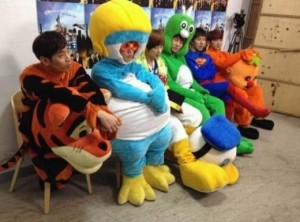 And while it’s not as blatant as the other examples, even Super Junior falls prey to this tendency. Super Junior’s variety line created of some of K-pop’s most prominent personalities, and as a group, the boys are always able to amuse. However, the previously mentioned variety line, as hilarious as they were, often took the spotlight away from other members. While all of the Super Junior boys surely have a distinct and well-beloved personality, it could be said that the more infamous members and their more outrageous antics discourage the other members in a way from further participating.
And while it’s not as blatant as the other examples, even Super Junior falls prey to this tendency. Super Junior’s variety line created of some of K-pop’s most prominent personalities, and as a group, the boys are always able to amuse. However, the previously mentioned variety line, as hilarious as they were, often took the spotlight away from other members. While all of the Super Junior boys surely have a distinct and well-beloved personality, it could be said that the more infamous members and their more outrageous antics discourage the other members in a way from further participating.
For these reasons, I find groups that don’t rely so much on a sole or a handful of members in variety so much more appealing. The likes of MBLAQ, 2AM, Shinhwa, and Infinite have a much more balanced dynamic where all the members are participant and full of personality. Sure Jo Kwon and Lee Joon are the ones that are more famously remembered for their variety personas in their groups respectively, but their fellow group members don’t slack at all, staying lively and participant when they are documented together. Infinite is just as enjoyable, since while they don’t have a clear renowned variety-dol (the closest thing they have is member Sungyeol), the group is still made of a multitude of distinct personalities with no one member being the sole focus. And the glorious men of Shinhwa are all hilarious and outrageous, each with a good amount of variety appearances under their highly dignified belts. They don’t necessarily rely on one member to get them by, part of the reason why they’re collectively considered variety gold.
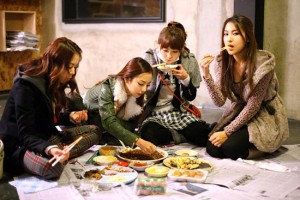 And I still believe SNSD, Kara, and the (highly underrated in variety) Brown Eyed Girls are most successful female groups in variety, since the groups are made of such distinct and balanced personalities that make their interaction so much more enjoyable. The general consensus prefers boy groups over girl groups when it comes to variety, partly because the girl groups are more image-conscious and less amusing, with only really one or two members ever being considered amusing or entertaining. However, I believe that the previously mentioned girl groups can put up quite the challenge. While some personalities are more remembered and applauded over others in these girl groups, the remainder of the members usually refrain from slacking, staying participant and distinct, traits that make them stand out in the idol section of K-variety.
And I still believe SNSD, Kara, and the (highly underrated in variety) Brown Eyed Girls are most successful female groups in variety, since the groups are made of such distinct and balanced personalities that make their interaction so much more enjoyable. The general consensus prefers boy groups over girl groups when it comes to variety, partly because the girl groups are more image-conscious and less amusing, with only really one or two members ever being considered amusing or entertaining. However, I believe that the previously mentioned girl groups can put up quite the challenge. While some personalities are more remembered and applauded over others in these girl groups, the remainder of the members usually refrain from slacking, staying participant and distinct, traits that make them stand out in the idol section of K-variety.
In conclusion, yes, designated variety idols can help a group twofold when it comes to variety. They can help get attention to the group through outside activities, spreading the group’s name and credibility. They can also help make the mood by starting conversations and clearing the atmosphere so their shier group members can participate. But while these designated variety-dols serve as effective crutches for groups to shine in variety, a group really shouldn’t rely on them too much lest the atmosphere seem contrived and reliant on one person. And likewise, a variety-dol shouldn’t be that much of a spotlight stealer, allowing their group members to have their time in the limelight. A balanced group really is best even in variety, since a good mix of distinct personalities and actual chemistry leads to some great interaction, the stuff that makes variety, especially idol-based variety, as enjoyable as it is.
Readers, what do you think of variety-dols?
(SBS, KBS2, jTBC)
